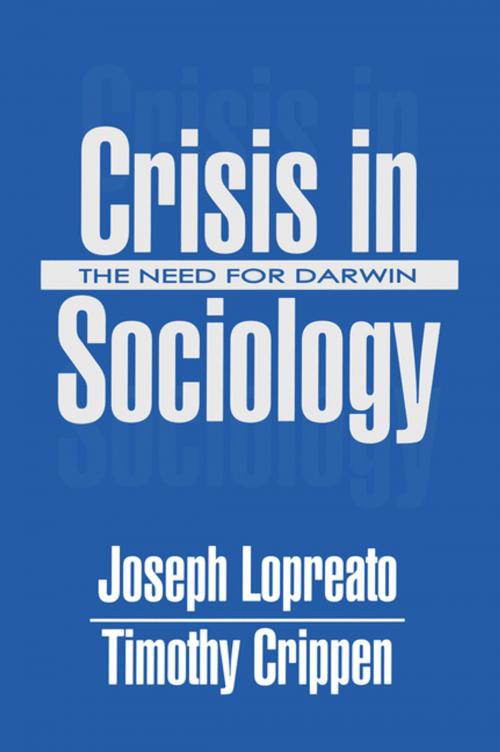Crisis in Sociology
The Need for Darwin
Nonfiction, Social & Cultural Studies, Social Science, Sociology| Author: | Joseph Lopreato, Timothy Crippen | ISBN: | 9781351320184 |
| Publisher: | Taylor and Francis | Publication: | February 6, 2018 |
| Imprint: | Routledge | Language: | English |
| Author: | Joseph Lopreato, Timothy Crippen |
| ISBN: | 9781351320184 |
| Publisher: | Taylor and Francis |
| Publication: | February 6, 2018 |
| Imprint: | Routledge |
| Language: | English |
Crisis in Sociology presents a compelling portrait of sociology's current troubles and proposes a controversial remedy. In the authors' view, sociology's crisis has deep roots, traceable to the over-ambitious sweep of the discipline's founders. Generations of sociologists have failed to focus effectively on the tasks necessary to build a social science. The authors see sociology's most disabling flaw in the failure to discover even a single general law or principle. This makes it impossible to systematically organize empirical observations, guide inquiry by suggesting falsifiable hypotheses, or form the core of a genuinely cumulative body of knowledge. Absent such a theoretical tool, sociology can aspire to little more than an amorphous mass of hunches and disconnected facts. The condition engenders confusion and unproductive debate. It invites fragmentation and predation by applied social disciplines, such as business administration, criminal justice, social work, and urban studies. Even more dangerous are incursions by prestigious social sciences and by branches of evolutionary biology that constitute the frontier of the current revolution in behavioral science. Lopreato and Crippen argue that unless sociology takes into account central developments in evolutionary science, it will not survive as an academic discipline. Crisis in Sociology argues that participation in the "new social science," exemplified by thriving new fields such as evolutionary psychology, will help to build a vigorous, scientific sociology. The authors analyze research on such subjects as sex roles, social stratification, and ethnic conflict, showing how otherwise disconnected features of the sociological landscape can in fact contribute to a theoretically coherent and cumulative body of knowledge.
Crisis in Sociology presents a compelling portrait of sociology's current troubles and proposes a controversial remedy. In the authors' view, sociology's crisis has deep roots, traceable to the over-ambitious sweep of the discipline's founders. Generations of sociologists have failed to focus effectively on the tasks necessary to build a social science. The authors see sociology's most disabling flaw in the failure to discover even a single general law or principle. This makes it impossible to systematically organize empirical observations, guide inquiry by suggesting falsifiable hypotheses, or form the core of a genuinely cumulative body of knowledge. Absent such a theoretical tool, sociology can aspire to little more than an amorphous mass of hunches and disconnected facts. The condition engenders confusion and unproductive debate. It invites fragmentation and predation by applied social disciplines, such as business administration, criminal justice, social work, and urban studies. Even more dangerous are incursions by prestigious social sciences and by branches of evolutionary biology that constitute the frontier of the current revolution in behavioral science. Lopreato and Crippen argue that unless sociology takes into account central developments in evolutionary science, it will not survive as an academic discipline. Crisis in Sociology argues that participation in the "new social science," exemplified by thriving new fields such as evolutionary psychology, will help to build a vigorous, scientific sociology. The authors analyze research on such subjects as sex roles, social stratification, and ethnic conflict, showing how otherwise disconnected features of the sociological landscape can in fact contribute to a theoretically coherent and cumulative body of knowledge.















